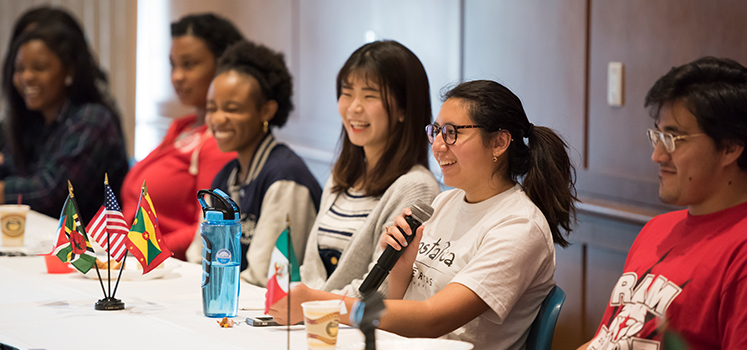The mission of the Department of World Languages and Cultures aligns with the UNC and WSSU strategic plan, to look beyond our state borders to a global world; to prepare our students to participate effectively in a global environment; to raise awareness of the full complexity of issues in our diverse global society, and to equip students for success and citizenship in a rapidly changing world and global economy.
WSSU focuses on the practical application of the lessons learned in the classroom through experiential opportunities, such as Study Abroad, that help students grow as scholars and practitioners. Highly experienced faculty teach classes that emphasize student-centered learning and collaboration. As the world and the global marketplace become more intertwined each day, fluency in another language provides a significant advantage for students pursuing professions such as education and healthcare, working for an international organization, or when traveling abroad. The Department offers students opportunities to complete a major in Spanish, with concentrations in Healthcare and Professions or Literature, and offers minors in Chinese, French, Portuguese, Spanish, and Swahili. Each of these programs complements other academic disciplines by offering classes through which students practice speaking the language and learn about the cultures of the world.
Programs of Study
Portuguese is the seventh most widely spoken language in the world, with over 200 million speakers on at least five continents. Students of Portuguese are encouraged to take advantage of study abroad in Brazil and other Portuguese-speaking countries. WSSU collaborates with institutional partners in Brazil to provide intensive summer programs in language and study in several disciplines. Contact the department for details. WSSU also refers students interested in semester and academic year study to the University of North Carolina Exchange Program (UNC-EP), which partners with four universities in the beautiful city of Curitiba, Brazil.
Kiswahili, or Swahili, is a major African language that serves as an official, national and a lingua franca in several countries in east and central Africa. As a language of wider communication, Kiswahili allows its speakers to interact with other people both at the regional, national and international levels. Swahili is spoken by more than 100 million people as a first, second, or even third language. In education, Swahili is the most important and widely studied indigenous language of Africa. It is studied in Asia, Latin America, Europe, and America because of its pivotal role in research, commerce, and interpersonal communication. The rich cultural information embedded in Swahili allows you as a student of the language to learn and understand how Swahili speakers from different countries conduct their social, political, and economic lives. The study of Swahili also provides interesting issues regarding language policies and language planning. Whatever the area of research one is in, be it linguistics, anthropology, engineering, archaeology or even medicine, knowledge of Swahili and its many varieties is essential if one is working in the eastern part of Africa.
Kenya Tanzania Study Abroad Program
The WSSU Summer Program in Kenya and Tanzania is an interdisciplinary program designed to promote knowledge and understanding of East Africa in a global context. The program aims to expose students to the cultural, political, economic and linguistic diversity in East Africa. Students experience the richness and diversity of Kiswahili language and culture. The program is open to students in all WSSU schools and departments, with a particular emphasis on the social sciences and humanities, education, and health sciences.
With the increasing economic development in China, as well as the rapid trade, economic, cultural exchanges between China and the rest of the world, its influence on the global stage has become more important. Chinese language is also becoming more commonly used throughout the world. Some facts you should know:
- China is one of the world’s oldest and richest continuous cultures, over 5000 years old.
- Over 1 billion people speak Chinese (including dialects) in the world.
- China emerges as the second largest economy in the world and one of the largest trading partners of the United States.
- Chinese is one of the five official languages used by the United Nations.

The department encourages students to study abroad for a summer, a semester, or one academic year. Students may study in Brazil, China, Costa Rica, France, Kenya/Tanzania, Mexico, and Spain.

Join the department as it celebrates world holidays such as Chinese New Year, Hispanic Heritage Month, Lady Liberty Day, and Brazilian Carnival.
International Day at Winston-Salem State University
The Retroactive Credit Policy is designed to grant credit to students with previous language study. Under this policy students who enroll in and successfully complete a course beyond the first semester of beginning foreign language receive credit for courses they bypassed up to 6 credit hours. Students receive credit towards graduation but no grade for the lower course(s). Retroactive credit is available only for the first language course in which a student enrolls and is given only when the student achieves a grade of C or better. Retroactive credit is not available if a student has received Advanced Placement or transfer credit in the language.
Students are advised to contact the Department of World Languages and Cultures for guidelines concerning placement. Retroactive credit is applied for at the completion of the course.
The Language Media Center in Hall-Patterson, Room 214 provides students in the Department of World Languages and Cultures with state of the art multimedia to learn languages and complete assignments and projects related to DWLC courses. The Media Center employs a full-time director to assist students in the development of the essential language skills of listening, speaking, reading, writing, viewing and culture.
The department offers free tutoring for students. Students enrolled in world language classes are encouraged to seek assistance in Chinese, French, Portuguese, Spanish, and Swahili. Contact the department for semester schedules.
The student lounge for English and Foreign language majors/minors is located in Hall-Patterson, Room 326. The lounge is equipped with computers and tables for student-centered activities.
Students are encouraged to use available resources at the C.G. O'Kelly Library to enhance their foreign language skills.
El club de español: Join El club de español to enjoy Spanish cultural activities, and meet other students interested in Spanish. You do not need to be a Spanish major or minor, or speak Spanish to join the club.
World Languages Film Club: Movies are scheduled every other week on either Thursday evenings or Friday afternoons. Contact the department for information on film listings.
Hispanic League
The Hispanic League is a locally based organization that works towards improving "the quality of life for Hispanics/Latinos by facilitating their inclusion, education and health while promoting cultural understanding, dignity, and respect." Spanish majors and minors volunteer every year during the league's street festival in downtown Winston-Salem. Visit their website for a list of events to promote the Latino presence in the Triad.
Qué pasa
Spanish language newspaper serving the Triad
Afro-Cuba Web
African presence in Cuba






